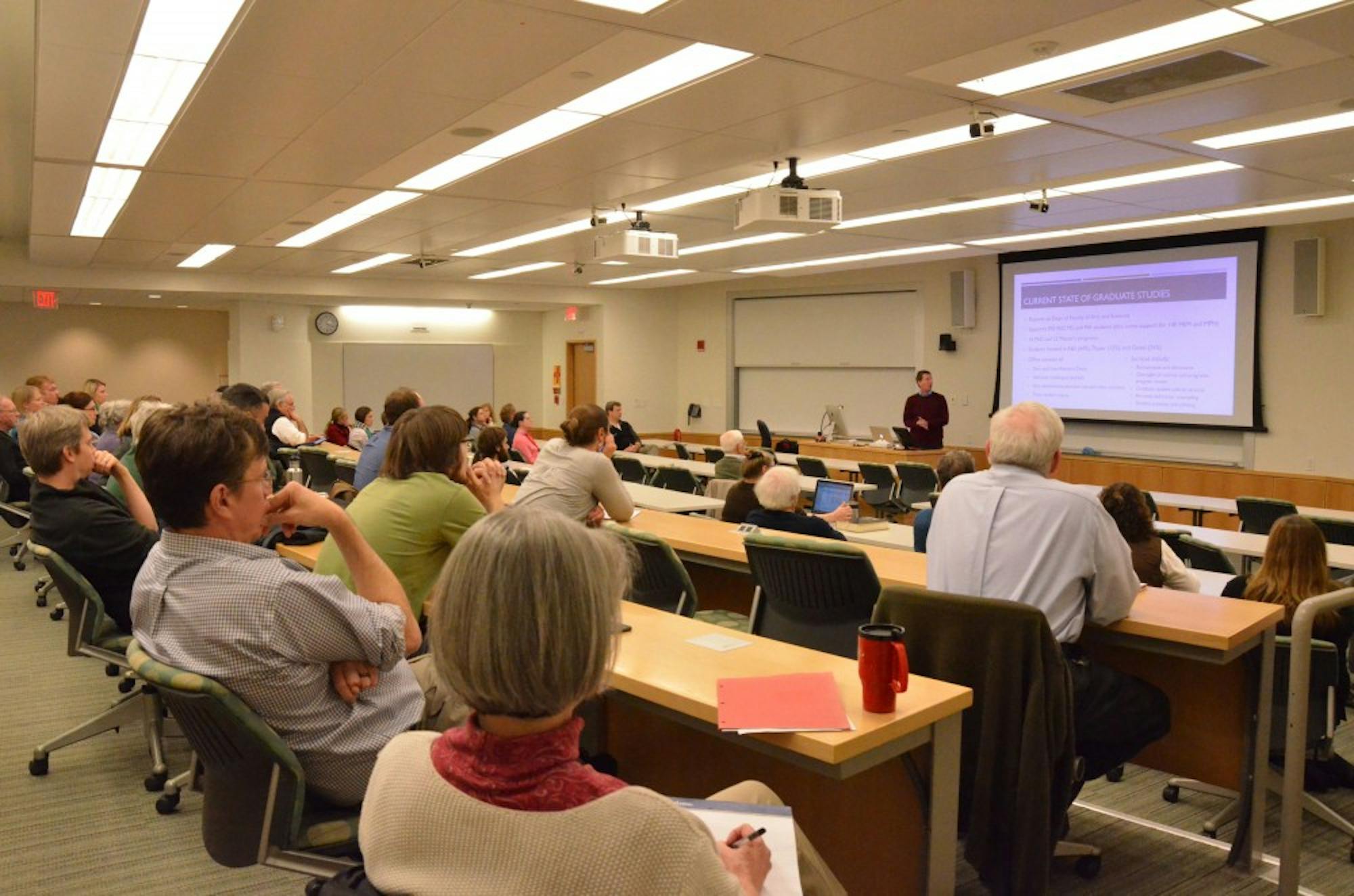Dean of graduate studies Jon Kull gave a third and final town hall presentation at the Life and Sciences Center Monday night, explaining a proposed plan for the College to reorganize itsgraduate programs under an administratively independent graduate school.
Much of the content of the presentation was the same as that shown in the previous two meetings. Kull repeated the proposed rationale for supporting the creation of the school — making it easier for graduate programs to advocate for and distribute their funding, enhancing cross-departmental programs and collaboration, increasing the quality of existing graduate programs and demonstrating a commitment to graduate research.
Kull did present a new slide outlining more specific details of the proposed school in response to confusion among faculty about the school’s role.
The school’s primary responsibilities, the slide said, would be “graduate academic affairs, communication and outreach, student records, finance and administration, graduate admissions, student life and the professional development and support of graduate students and [postdoctoral fellows].”
The Council on Graduate Studies will continue to provide recommendations for graduate education, review proposed graduate degree programs and certify that candidates are eligible to receive graduate degrees, he said.
Kull also said the proposed plan does not necessarily need to incorporate all suggestions from the task force’s report. This had been a cause of confusion among faculty, he said.
“It’s just a menu of ideas…that the task force thought was good,” he said.
Turnout for this third meeting was much higher than for previous meetings. Over 40 people showed up for the presentation, compared to around 20 who attended each of the first two.
With the greater turnout came a greater number of questions. One audience member wanted to know who exactly would be reporting to the proposed dean of graduate and advanced studies.
Faculty would continue to report to their own deans, not the graduate school dean, Kull said. The graduate school dean would be more concerned with overseeing graduate student life and reviewing curriculum and graduate programs, he said.
In response to a question about what the proposed school would change for current graduate programs, Kull said there would not initially be many changes in terms of day-to-day functioning. Over time, he expected that more resources would come to the school and be distributed to the programs, he said.
One audience member asked about negative feedback from some arts and sciences faculty members.
While he did not wish to speak for other faculty, Kull said he thought one concern from arts and sciences faculty members was that they felt the proposed school would simply be taking resources away from them. He clarified that the proposed school would not take any additional funding from arts and sciences aside from what is already being allocated to the graduate department, he said.
“I see it as a fairly small fraction of the [arts and sciences] budget,” he said.
Moving those resources to an independent graduate school would protect an important source of graduate school funding, Kull said.
Another topic that came up repeatedly during the meeting was the role of postdocs. By expanding their funding and support, the proposed school would increase their role at the college, Kull said. This would be a benefit for many departments, even those without graduate programs, he said.
“Many of the [arts and sciences] departments who are not interested in having graduate programs for one reason or another are very interested in having postdocs,” he said.
Another audience member supported this point of view, noting that a desire for postdocs united members of the arts and sciences faculty.
Faculty interviewed at the meeting — mostly from science departments — were supportive of the plan.
Roger Sloboda, a biology professor and former dean of graduate studies, said the idea of an independent graduate school has been discussed for a long time. Moving toward forming such a school is a good idea, he said.
When asked for his opinion on the potential effects of the proposed school on undergraduate education, Sloboda said he does not like the idea of justifying graduate education in terms of its effects on undergraduates. That said, increased graduate programs would only help undergraduate students by attracting top researchers, he said. Schools that lack major research programs, like Amherst College and Williams College, do not deliver the same level of science education as major research universities, he said.
Biology professor Rob McClung echoed these sentiments. Undergraduate education in many science departments is dependent on the presence of graduate students, he said. Because of this reliance, he thought many members of the science department were supportive of the new plan, though he did not know if humanities and social science professors felt the same way.
McClung also expressed some skepticism that having an independent school would necessarily attract more faculty, since he believes most junior faculty being hired are not concerned with such administrative details.
Engineering professor Brian Pogue, who is a member of the proposed school’s task force, said it is important to remain competitive with other Ivy League schools and that by enhancing the focus on graduate research, the proposed school would contribute to that goal.
There will be a presentation to the general faculty on Nov. 16, likely led by College President Phil Hanlon and Provost Carolyn Dever, Kull said. A vote from the faculty on proceeding with the school will be taken then, though the results will be non-binding.
Arts and sciences faculty will also hold a separate faculty meeting to discuss and vote on the issue, Kull said in an interview after the town hall.
The final step would likely be a vote of approval by the Board of Trustees, Kull said.




